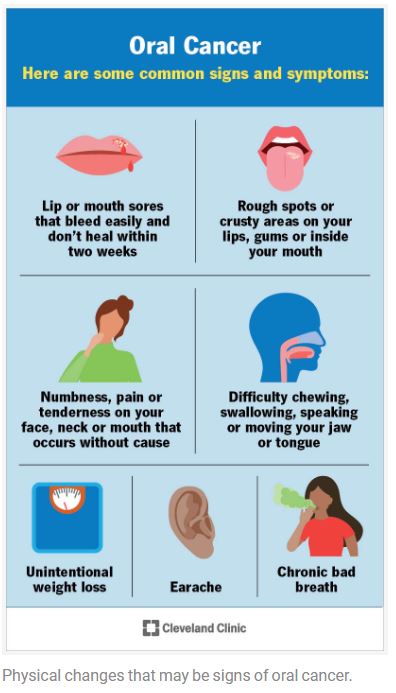No one wants to talk about Oral Cancer. However, being educated on the topic can ease our concerns. Early signs of oral cancer can often be mistaken for other problems, like a toothache or cold. If symptoms continue, it is essential to see your doctor, so if oral cancer is present, you are diagnosed as soon as possible. Many symptoms caused by oral tumours may be due to other, less serious conditions or other cancers.
Oral cancer (mouth cancer), the most common form of head and neck cancer, typically affects people aged 60 and older. Oral cancer affects your lips and the first parts of your tongue, mouth roof and floor. It also affects the last part of your tongue, roof of your mouth, tonsils, sinuses and the sides and back of your throat. As it can be life-threatening, early diagnosis and treatment are critical to a positive outcome.
Symptoms of Oral Cancer
The most common oral cancer symptoms include:
- Persistent mouth sores that do not heal and persistent mouth pain
- Unexplained bleeding in the mouth
- A swellings/lumps or thickening in the cheek or a lump in the neck
- Eroded areas on lips, gums, cheeks or other areas inside the mouth
- White/red patches on gums, tongue, tonsils, or mouth lining
- Persistent sore throats or feeling that something is caught in your throat
- Difficulty swallowing, chewing, moving your jaw or tongue
- Numbness of tongue/mouth
- Jaw swelling making dentures hurt or fit poorly
- Loose teeth, voice changes
- Weight loss
The graphic provided by Cleveland Clinic is a great illustration of potential symptoms.
Risk factors for Oral Cancer include:
- Smoking. Cigarette, cigar, or pipe smokers are six times more likely to develop oral cancers than nonsmokers.
- Smokeless tobacco use. Users of dip, snuff or chewing tobacco products are 50 times more likely to develop oral cancer.
- Excessive consumption of alcohol.
- Family history of cancer.
- Excessive sun exposure, especially at a young age, can cause lip cancers.
- Human papillomavirus (HPV). A specific type of this virus causes a growing number of men under 50 to get cancers in the back of their mouths and throats from oral sex.
- Age. Oral cancers can take years to grow, with most people finding they have it after age 55.
- Gender. Men are twice as likely as women to get oral cancer.
- Poor diet. There is a link between oral cancer and not eating enough vegetables and fruits.
Note that oral cancers occur in 25 % of people who do not smoke and only drink alcohol occasionally.
How to Prevent Oral Cancer
Oral cancer starts when the DNA inside your mouth’s cells gets damaged. To prevent oral cancer:
- Don’t smoke or use tobacco products and drink alcohol in moderation (and refrain from binge drinking).
- Eat a well-balanced diet.
- Limit your exposure to the sun. Repeated exposure increases cancer risk on the lip, especially the lower lip. Use UV-A/B-blocking sun-protective lotions on your skin and lips when in the sun.
You can take an active role in detecting oral cancer early by:
- Conducting a self-exam at least once a month. Click on the link below for the 2-minute “do it yourself self-examination” that could save your life!
- See your dentist regularly. Even though you may be conducting frequent self-exams, dangerous spots in the mouth can be very tiny and difficult to see. We recommend oral cancer screening exams every three years for persons over age 20 and annually for those over age 40. Have your dentist perform an oral exam during your next dental appointment, as early detection improves the chance of successful treatment.
It is important to see your dentist twice a year and make time to do a monthly self-examination. If you have more questions, connect with Kesteven Dental Care Studio at 604-826-0870 or drkesteven@shaw.ca and we would be glad to address any of your concerns.
By Lorelei Kesteven


